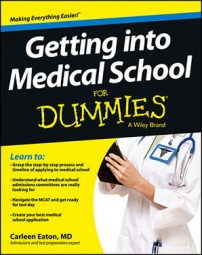Sitting across a table from a faculty member and talking one-on-one about your medical school application, doesn’t represent the full the range of interview formats used by medical schools. At some schools, applicants face multiple interviewers at once, interview alongside other applicants, or participate in a multiple mini-interview (MMI), which involves rotating to a different station every ten or so minutes.
Even if a traditional interview format is used, the amount of information the interviewer knows about an applicant varies from school to school. At one school, an interviewer may know nothing more than your name; at another, he may know every piece of information you’ve submitted during the application process.
If the school uses an MMI, it will very likely inform you in advance to expect this format. However, you may not be told the details of a traditional interview format, such as whether it’s one-on-one, panel, or open or closed file, until the day of the interview.
By familiarizing yourself with the many setups you may encounter during interview season, you’ll be prepared to shine no matter what method a school favors for assessing applicants.
One-on-one and panel medical school interviews
Although the variety of interview formats has increased in recent years with the introduction of the MMI, most schools still use a standard-format interview, which utilizes either a one-on-one or a panel setup.
In a one-on-one interview, an individual interviewer meets with a single applicant at a time. The interviewer is usually a member of the school’s faculty or staff, a medical student, or a physician from the community.
In the most common format, a student has interviews with two different interviewers, with each session lasting anywhere from 20 minutes to over an hour, although 30 to 45 minutes is typical.
In a panel interview, the applicant faces a panel of two or three interviewers instead of meeting with one interviewer at a time. With a panel interview, a single applicant may interview alone or with one or more other applicants at the same time.
Although panel interviewers tend to be more intimidating than individual ones, the essential approach to preparing for the two is the same.
Open file, closed file, and semi-open file medical school interviews
When you walk in the door, what does an interviewer know about you? Your interview will fall into one of the following categories based on the answer to that question:
Open file: In an open file interview, your interviewer has access to your application file, so he may ask you questions about particular activities you’ve listed, inquire about weaknesses in your application, or ask you to elaborate on topics discussed in your personal statement.
Closed file: A closed file or blind interview means the interviewer knows very limited information about you — perhaps only your name. An interviewer may begin a closed file interview with a broad prompt or question, such as “Tell me about yourself” or “Why do you want to be a physician?” because he doesn’t have any specific information to work from at the outset.
The intent of a closed file interview is to eliminate the halo effect, in which an interviewer may be biased by your credentials. For example, an interviewer may be primed to be impressed by your answers if he sees that you nailed a 38 on the MCAT and have been published in a prestigious journal, while those with less-impressive records are stuck facing a more skeptical audience.
Semi-closed file: A hybrid of the two types of approaches is the semi-closed interview, in which schools give interviewers some information from your file, such as the personal statement and/or activities section, but withhold your MCAT score and GPA.
This approach allows the interviewer to be familiar with some aspects of an applicant’s background but prevents bias based on the quantitative factors.
If you have multiple one-on-one interviews at a school, one of your interviews may be open file and the other closed, or all interviewers may have access to the same amount of information.
For panel interviews, all members of the panel may have read your file, or only one of the interviewers on the panel may have been given your full application while the others have limited or no background information about you. Even if you know the interview is open-file, don’t assume the interviewer has memorized your application.
How familiar the interviewer is with your background affects the type of questions you’re asked and how you respond to them. Some schools tell interviewees in advance whether an interviewer has access to their files. Other times, an interviewer may reveal to the applicant at the beginning of the interview whether he has read the application.
When in doubt, err on the side of assuming that the interviewer hasn’t read your file so that you don’t leave gaps in your story or gloss over relevant information that the interviewer may not be aware of.

